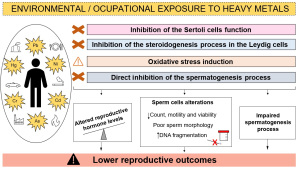
How Heavy Metals Can Disrupt Women’s Orgasms
How Heavy Metals Can Disrupt Women’s Orgasms And What You Can Do About It Let’s talk about something that doesn’t get talked about nearly enough: women’s orgasms—or the lack of

Mercury poisoning is a critical health issue that arises from the excessive presence of mercury, a heavy metal detox , in the body. It is also referred to as mercury toxicity. Due to mercury’s dangerous properties, the substance can lead to severe and sometimes fatal health problems when exposed or ingested in significant amounts.
Mercury is a naturally occurring element in air, water, and soil. It has several forms: elemental (or metallic) mercury, inorganic mercury, and organic chlorella mercury compounds. Despite its ubiquity, it is a dangerous neurotoxin, and its impact on human health can be significant. Here are some common sources of mercury:
Reducing mercury exposure requires being aware of these sources and taking steps to avoid them when possible. Always dispose of mercury-containing products at a recycling facility or a waste collection event that accepts hazardous materials. Do not put items containing mercury in the trash. Contact your doctor immediately if you suspect you have been exposed to mercury.
The ingestion or inhalation of mercury vapors predominantly causes mercury poisoning. This can occur through consuming certain types of fish and shellfish with high levels of methylmercury, a highly toxic form of mercury. Other sources of exposure include certain occupational environments, mercury spills in the home, and the use of products or medications containing mercury.
Inhalation of mercury vapor can occur when mercury products break and release mercury into the air, particularly in warm or poorly ventilated indoor spaces. Direct exposure to elemental mercury can also cause mercury poisoning, for example, during dental procedures involving amalgam fillings.
The Effects of Mercury on the Body
Mercury primarily affects the nervous system and kidneys when ingested or inhaled. The brain is a chief target of mercury poisoning, and prolonged exposure can result in neurobehavioral changes. The most serious effects occur due to prenatal exposure, which can lead to neurological developmental disorders in children.
In adults, excessive mercury exposure can result in tremors, mood swings, neuromuscular changes, and even memory loss. Mercury also harms the digestive and immune systems, lungs, and kidneys, often causing severe damage.
Mercury poisoning symptoms vary depending on the type of mercury exposure. In general, the common signs of mercury poisoning include:
Children with acute mercury toxicity may show symptoms such as red cheeks, nose, and lips, loss of hair, teeth, and nails, transient rashes, hypotonia (muscle weakness), and photophobia (sensitivity to light). Other symptoms may include kidney dysfunction and memory troubles.
Low-grade mercury toxicity, the exposure to small doses over time, often goes unnoticed because its symptoms can be subtle and easily attributed to other common health issues. However, knowing these symptoms is important to ensure timely detection and treatment. Here are some common symptoms associated with low-grade mercury toxicity:
These symptoms can vary greatly from person to person and depend on the mercury type one has been exposed to. If you suspect you may be experiencing symptoms of mercury poisoning, it’s important to seek medical attention promptly.
In prolonged exposure, symptoms might include numbness and pain in certain parts of the skin, unsteady gait, clear signs of impairment (mental function), memory loss, and difficulties with speech.
One aspect of mercury poisoning that can’t be overstated is its long-term impact on an individual’s health. Chronic mercury poisoning, due to ongoing low-level exposure, often permanently damages the brain, kidneys, and lungs.
These can manifest as progressive, debilitating neurological symptoms, irreversible kidney disease, and restrictive lung disease.
The impact can be even more devastating in pregnant women, as mercury can cross the placental barrier, causing developmental disorders and neurological deficits in unborn children.
Diagnosing detox supplements mercury poisoning can be challenging because the symptoms often mimic those of other conditions. Furthermore, the signs and symptoms can be delayed and may take months or even years to appear, particularly in chronic, low-level exposure cases.
Specialized testing is required to confirm the diagnosis. This often includes blood and urine tests and, in some cases, hair or nail analysis to measure levels of mercury.
Once the diagnosis is confirmed, the key to effective treatment is the removal of the source of exposure, followed by a detoxification process to eliminate the accumulated mercury from the body. This is typically achieved through chelating agents, substances that bind to heavy metals in the body and facilitate their excretion through urine or feces.
Treatment for mercury poisoning depends on the type and degree of exposure. For instance, if mercury poisoning is due to exposure to metallic mercury vapors, the patient may need to move away from the exposure site. For severe cases, hospitalization may be required. Treatment may include using medications or chelating agents to help remove mercury from the body.
Prevention involves avoiding mercury exposure. If you suspect you’ve been exposed to mercury, seeking medical attention is crucial. Limiting your consumption of fish with high levels of methylmercury, properly disposing of items containing mercury, and avoiding skincare products or medications with mercury are all vital preventive measures.
Understanding the dangers of mercury poisoning can lead to effective measures to reduce exposure and protect health. By recognizing the symptoms of mercury poisoning, you can seek timely treatment and reduce the risk of long-term health complications.
HMD’s range of products, including the HMD Ultimate Detox Protocol and the HMD Heavy Metal Hair Test, are specifically designed to assist the body’s detoxification process. These have been scientifically proven to facilitate the elimination of heavy metals, including mercury, without causing any harmful side effects. Moreover, they are 100% natural and suitable for vegetarians and vegans detox pack.
If you have been experiencing symptoms that might suggest mercury poisoning, we strongly recommend seeking professional medical advice immediately. Once you’ve consulted your healthcare provider, consider using HMD’s products heavy metal detox as part of your journey toward recovery and optimal health. The ultimate goal is to regain health and vitality and protect yourself from further exposure.
Mercury poisoning is a severe medical condition, but we can reduce our exposure and safeguard our health with awareness and appropriate steps. Remember, prevention is always better than cure when it comes to health. Stay safe, and stay informed.
Given the pervasive presence of mercury in our environment, awareness and prevention are the keys to protecting oneself from mercury poisoning. This means being mindful of the products we use and the food we consume. Avoiding or limiting the consumption of fish known to contain high levels of mercury, disposing of mercury-containing products properly, and steering clear from mercury-containing skincare products and medications are all essential steps to minimize mercury exposure.
Mercury poisoning can have debilitating and lasting impacts on an individual’s health. However, with awareness, prevention, and the right treatment, it’s entirely possible to combat this danger. By understanding what mercury poisoning is, what causes it, how it affects the body, and the common symptoms, we can all take proactive measures to protect our health and well-being.
Remember, the first step towards effective treatment recognizes the problem. Be mindful of the signs of mercury poisoning, and don’t hesitate to seek help if you suspect you’ve been exposed. With knowledge, vigilance, and the right resources, we can guard ourselves and our loved ones against the harmful effects of mercury.
Read more: heavy metal detox kit

Alkaline Detox Diet best body detox best detox kit best detox supplements best full body detox best heavy metal detox best heavy metal detox for adults best herbal detox best metal detox best thc detox kit body cleanse supplements body detoxification supplements Causes Arsenic Poisoning children and heavy metals chlorella detox Copper Toxicity in Drinking Water detox kit detox pack detox supplements detox tablets Does Sweating Really Release early symptoms of heavy metal toxicity full body detox kit hair mineral analysis heavy metal detox heavy metal detox kit heavy metals detox heavy metals in food Heavy Metals in Makeup Heavy Metals in US Foods HMD Heavy Metal Detox HMD Ultimate Detox Pack Natural Heavy Metal Detox natural supplement for aluminum ORGANIC CHLORELLA pure body detox pure body extra detox Sexual desire in women Sources of Copper Exposure Thallium Poisoning toxic metal detox Toxic metals and sex Toxic metals and women's sexual desire toxic metals in food ultimate detox

How Heavy Metals Can Disrupt Women’s Orgasms And What You Can Do About It Let’s talk about something that doesn’t get talked about nearly enough: women’s orgasms—or the lack of

Men’s Sexual Health and Heavy Metals How Heavy Metals Wreak Havoc on Male Sexual Function Let’s get into the mechanics. Sexual health, especially things like getting and maintaining an erection,

How Heavy Metals Can Wreck a Woman’s Sexual Libido And What You Can Do About It Let’s talk about something that doesn’t often get enough attention: how environmental toxins, hefty
Detoxmetals.com specializes in natural heavy metal detox supplements for eliminating heavy metals naturally from the body.
GMG DA VINCI HEALTH LTD Panayia Aimatousa 300 Aradippou 7101, Larnaca Cyprus
[sibwp_form id=1]
If you’re not receiving an email in your inbox, please check your spam folder. Sometimes legitimate emails can be mistakenly marked as spam. If you find the email there, you can mark it as “Not Spam” to ensure future messages from that sender go to your inbox
